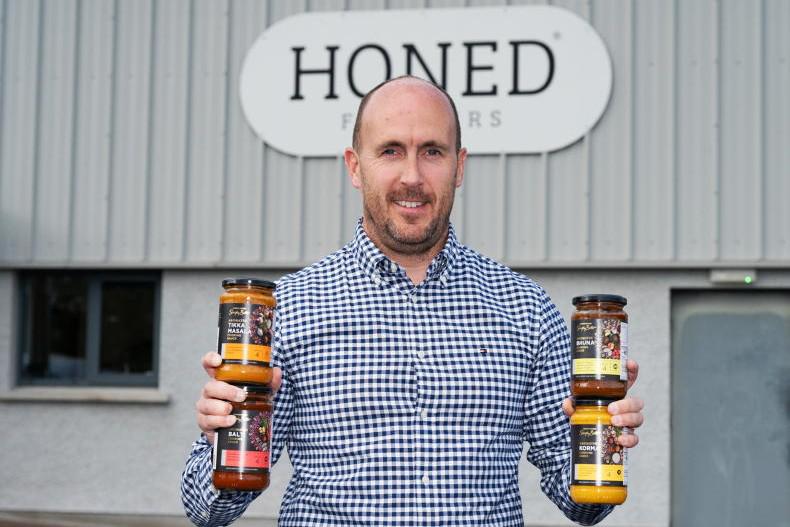There is a secret pleasure that is rooted deep in the Irish psyche, and it becomes overtly manifest throughout the country at this time of the year.
The focus of this national obsession originated in South America and made its way to our little island some time in the 16th century. It might be understood in the context of some kind of narcotic as it gained an overwhelming popularity from the 18th century onwards, dominating the lives of all Irish people up to the present day.
The Irish drug is of course the potato and as each year comes around, the month of June sees the arrival of the “new potatoes” when the fervour of the dedicated potato-eater is off-the-scale. It was in our local supermarket last week that I found myself face-to-face with another “new potato” fanatic.
An open display of new potatoes had been placed enticingly just inside the entrance of the shop, with bags provided so customers could pick and choose the size and quantity of their desire. My preference for the very first new potatoes is for the small potatoes: their old name póirín, “poreen”, being immortalised in song by Christy Moore, singing of Ronald Regan and his ancestral home of Ballyporeen.
I eye-balled my neighbour, as we competitively filled our respective bags, both knowing that we were operating from some acculturated uncontrollable impulse. He too was in search of the poreens, leaving aside any that looked green or did not possess the delicate flaking yellow skin. I could barely contain myself on the drive home in anticipation of the feed of new potatoes for dinner.
June availability of new potatoes can only be likened to the euphoria experienced at the arrival of the Beaujolais nouveau in France
The communal Irish sense of excitement at the June availability of new potatoes can only be likened to the euphoria experienced at the arrival of the Beaujolais nouveau in France.
That evening, I was entirely indifferent to the pork chop or the bit of chicken or any other vegetable that might be on the plate; the pommes-de-terre nouvelles were all that mattered.
Balls of flour
Some refer to potatoes as “spuds”, which can be a harsh term, while others will use the child-friendly nomenclature of “poppys”, yet whatever they are called, all will agree that the ideal potato needs to be a “ball of flour”!
To achieve this, unlike the “old potatoes” that are put into cold water, the new potatoes should be plunged into boiling salted water, or better again, they can be steamed.
The trick is to try to keep their delicate skins intact, preserving the dry floury inside. To this end, those living by the sea in the past, boiled the potatoes in sea water. When they are ready and their skins just beginning to crack a smile, it is important to place a tea-towel in the drained pot to absorb any steam and vestiges of moisture.
It is at this point that one weighs up the immediate pleasures of the flesh against sound medical cardiac advice on cholesterol and potential blockages, for new potatoes are nothing without their perfectly suited accompaniment, butter!
Dry, warm floury new potatoes swimming with lakes of melting, yellow, Irish butter with a liberal seasoning of salt and pepper is as close to culinary nirvana as one can get in this world.
There were great names for the different potatoes in the past: Aran Banners, Sharps Express, Black Bulls, Agemors, Aran Chiefs, Dolls Houses, Gladstones, British Queens, May Queens, Irish Queens, Duke of Yorks, Kerry Blues, Epicures, Kerrpinks, Sinn Féiners, Golden Wonders, Early Roses, Champions, Arcairns, Up-to-Dates, Duchess of Cornwalls, Red Cups, Flounders, Great Scotts, Clarkes Main crop, Home Rulers, Shamrocks, and Aran Victors.
The most sought after new potatoes are the “Queens” and it reminds me of a great story when two bachelor brothers were sitting down to their first feed of new potatoes. One brother had dug them, but scarred and bruised them with the spade and in the end over-boiled them until they were pure mush.
At the table, the other brother, discarding one after the other, declared, “The ‘British Queens’ are rotten!’ to which his brother replied, “Sure, anyone who read their history books would know that!”
Shane Lehane is a folklorist who works in UCC and Cork College of FET, Tramore Road Campus. Contact: shane.lehane@csn.ie
Read more
Folklore with Shane Lehane: the bog in May
Folklore: Irish pancakes – different to the French counterparts
There is a secret pleasure that is rooted deep in the Irish psyche, and it becomes overtly manifest throughout the country at this time of the year.
The focus of this national obsession originated in South America and made its way to our little island some time in the 16th century. It might be understood in the context of some kind of narcotic as it gained an overwhelming popularity from the 18th century onwards, dominating the lives of all Irish people up to the present day.
The Irish drug is of course the potato and as each year comes around, the month of June sees the arrival of the “new potatoes” when the fervour of the dedicated potato-eater is off-the-scale. It was in our local supermarket last week that I found myself face-to-face with another “new potato” fanatic.
An open display of new potatoes had been placed enticingly just inside the entrance of the shop, with bags provided so customers could pick and choose the size and quantity of their desire. My preference for the very first new potatoes is for the small potatoes: their old name póirín, “poreen”, being immortalised in song by Christy Moore, singing of Ronald Regan and his ancestral home of Ballyporeen.
I eye-balled my neighbour, as we competitively filled our respective bags, both knowing that we were operating from some acculturated uncontrollable impulse. He too was in search of the poreens, leaving aside any that looked green or did not possess the delicate flaking yellow skin. I could barely contain myself on the drive home in anticipation of the feed of new potatoes for dinner.
June availability of new potatoes can only be likened to the euphoria experienced at the arrival of the Beaujolais nouveau in France
The communal Irish sense of excitement at the June availability of new potatoes can only be likened to the euphoria experienced at the arrival of the Beaujolais nouveau in France.
That evening, I was entirely indifferent to the pork chop or the bit of chicken or any other vegetable that might be on the plate; the pommes-de-terre nouvelles were all that mattered.
Balls of flour
Some refer to potatoes as “spuds”, which can be a harsh term, while others will use the child-friendly nomenclature of “poppys”, yet whatever they are called, all will agree that the ideal potato needs to be a “ball of flour”!
To achieve this, unlike the “old potatoes” that are put into cold water, the new potatoes should be plunged into boiling salted water, or better again, they can be steamed.
The trick is to try to keep their delicate skins intact, preserving the dry floury inside. To this end, those living by the sea in the past, boiled the potatoes in sea water. When they are ready and their skins just beginning to crack a smile, it is important to place a tea-towel in the drained pot to absorb any steam and vestiges of moisture.
It is at this point that one weighs up the immediate pleasures of the flesh against sound medical cardiac advice on cholesterol and potential blockages, for new potatoes are nothing without their perfectly suited accompaniment, butter!
Dry, warm floury new potatoes swimming with lakes of melting, yellow, Irish butter with a liberal seasoning of salt and pepper is as close to culinary nirvana as one can get in this world.
There were great names for the different potatoes in the past: Aran Banners, Sharps Express, Black Bulls, Agemors, Aran Chiefs, Dolls Houses, Gladstones, British Queens, May Queens, Irish Queens, Duke of Yorks, Kerry Blues, Epicures, Kerrpinks, Sinn Féiners, Golden Wonders, Early Roses, Champions, Arcairns, Up-to-Dates, Duchess of Cornwalls, Red Cups, Flounders, Great Scotts, Clarkes Main crop, Home Rulers, Shamrocks, and Aran Victors.
The most sought after new potatoes are the “Queens” and it reminds me of a great story when two bachelor brothers were sitting down to their first feed of new potatoes. One brother had dug them, but scarred and bruised them with the spade and in the end over-boiled them until they were pure mush.
At the table, the other brother, discarding one after the other, declared, “The ‘British Queens’ are rotten!’ to which his brother replied, “Sure, anyone who read their history books would know that!”
Shane Lehane is a folklorist who works in UCC and Cork College of FET, Tramore Road Campus. Contact: shane.lehane@csn.ie
Read more
Folklore with Shane Lehane: the bog in May
Folklore: Irish pancakes – different to the French counterparts








SHARING OPTIONS